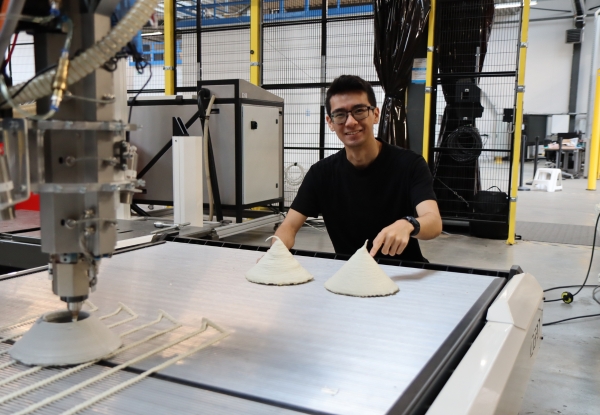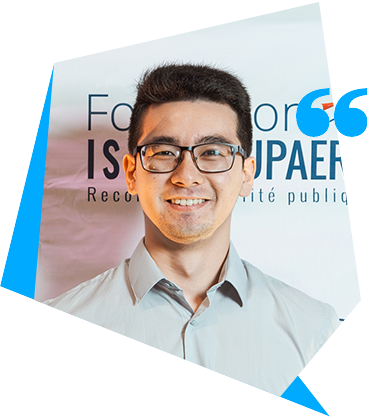< back to articles
6-month internship at SAM XL – Delft for Gustavo
Published on
Gustavo was supported by the Foundation for a 6-month internship at SAM XL – Delft in the Netherlands. The aim of this stay was to continue the cooperation already initiated by a professor from ISAE-SUPAERO and the TU Delft, but also to develop his knowledge in mechanics, printing and robotics and to pursue this subject as a thesis next year.

Why did you choose to do this internship at SAM XL-Delft?
I developed an interest in research a few years ago. My journey in this field began when I was still in Brazil, where I discovered my passion for scientific innovation and the challenges of research, and continued at ISAE-SUPAERO, where I worked under the supervision of Professor Joseph Morlier. This internship is the result of a collaboration with Professor Kunal Masania, from TU Delft, who made the connection with SAM XL and who will welcome me next year as a PhD student in his laboratory.
Another great motivation for me to pursue this collaboration is TU Delft’s international reputation, both in Europe and worldwide, and I was able to verify this during the 6 months I spent there. The infrastructure is a big plus point, and their vision for the future aligns with my own, which made it easy for me to find internship and thesis topics that interested me and had a potential impact on society.
How did the research trip go?
Gustavo Asai

My stay was enriching on several levels: professionally, it was an opportunity to put my skills into practice in a field close to the one in which I usually work. I’ve always worked on the numerical modeling of structures and their optimization, but during the internship I was able to concentrate on a real project, a manufacturing process. I also took the opportunity to learn about some very interesting subjects in which I had no previous experience, such as robotics, automated manufacturing and systems control.
SAM XL is a manufacturing automation research center whose aim is to connect university and industry. This internship therefore gave me a more complete view of the life cycle of technologies that are created in the laboratory, but which need to be adapted so that they can be used on a large scale in industry. My project had a strong research component. The aim was to understand how the phenomenon of material cooling works during 3D printing using robots, which is quite different from what we see in small printers.
I also worked on the design of a thermal data acquisition system and the control loop that adapts the robot’s speed to ensure it is always at the right temperature. This second part allowed me to gain practical experience of manufacturing, which until then had been nothing more than mathematical models that I added to my optimization algorithm.
The team was neither too small nor too big, so I got to know all my colleagues. Many of them helped me with my project, each in their own area of expertise (mechatronics, robot programming and operation, composites, 3D printing, computer vision, automation, networks and others). The atmosphere was very pleasant, and we took part in a number of team events, which reinforced my integration and facilitated exchanges.
What do you remember about your stay?
For me, the most memorable moment of this internship was towards the end of my stay, when I presented my work to the whole company, including those who knew every detail of what I had done, those who helped me during a specific part of the project, and those who had almost no idea what I was doing. For 45 minutes, I presented the main challenges I had encountered before arriving at the final configuration, and gave a demonstration in which all the systems I had developed worked perfectly (hardware and software level).
The internship has obviously provided me with very important knowledge for my professional and academic life, but it has also had a more immediate impact that I’m delighted about: my system will be used for all future prints with this robot, and it’s a first step for other projects that may add new capabilities or further study the thermodynamics and themomechanics of large-scale 3D printing.
It was also a period during which I was able to practice my English, especially conversational English, as all communication within the company and the university was in English. What’s more, I had a lot of contact with the Dutch language, and I think I’ve reached a basic level that will be really useful when I return to the Netherlands to do my thesis. I consider that speaking the language of the host country is essential to be well integrated into its society, and I plan to further improve my level of Dutch in the meantime.
And on a personal level?
Personally, I liked the country in general (except for the weather, perhaps). The culture and organization of the country are very different from Brazil and France, in small towns as well as larger ones like The Hague and Rotterdam (which are nothing like São Paulo or Paris, for example). The most interesting part, in my opinion, is the very good infrastructure for bicycles, which bring life to the streets and a sense of freedom, as all the cities are connected and it’s possible to cross the country by bike without too much trouble (you’d normally need to be in good physical shape to do so, but it’s always a good option for visiting nearby cities).
What’s next for you now that you’ve finished this trip?
I’ll be returning to Delft in January 2025 to start my thesis in the Shaping Matter Lab, the laboratory coordinated by Professor Masania at TU Delft. I’ll be working in the field of numerical methods for optimizing manufacturing structures and processes, particularly thermoplastic composite materials in the context of the transition of the aeronautical sector. This work is closely linked to that previously undertaken at ISAE-SUPAERO with Professor Morlier, and this collaboration will continue during my 4-year stay at TU Delft.
While I was working for another institute on campus during this internship, we were also very close to the Faculty of Aerospace Engineering, and I had the opportunity to meet my future colleagues and discover their research themes, which enabled me to refine my own. I’m still not sure what my project will be after these 4 years of thesis, but this stay in Delft was very useful to give me the certainty that I’ve made the right choices so far.
Any final words?
I would like to thank all the Foundation’s donors for their support, which was essential for my final year internship and the continuation of my academic project in the Netherlands. This stay gave me important professional knowledge, but also unique personal experiences that I will treasure for the future.